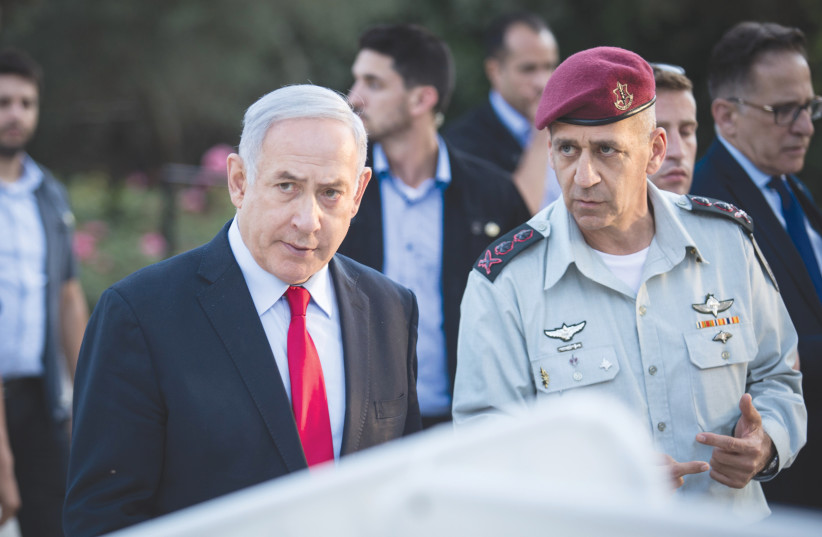One of the major failings of the 2015 Joint Comprehensive Plan of Action was that it merely delayed Iran’s program rather than stopping it.
By JPOST EDITORIAL JANUARY 31, 2021 21:30
Did Aviv Kochavi attack a future deal with Iran to score political points with Benjamin Netanyahu?
The attack near the Israeli Embassy in New Delhi last week claimed by the Jaish ul-Hind terrorist organization affiliated with Iran was yet another reminder that the problem with the ayatollahs’ regime in Tehran includes both its nuclear aspirations and its support of global terrorism.
One of the major failings of the 2015 Joint Comprehensive Plan of Action was that it merely delayed Iran’s program rather than stopping it. Another drawback is that it actually rewarded Iran with a cash infusion that was not spent on alleviating economic suffering at home but on arming and galvanizing Iranian-sponsored terrorist organizations around the world.
Iran’s nuclear intentions and sponsorship of terrorism are problems that are not going to disappear of their own accord. The new US administration under President Joe Biden will need to deal with this issue early on. Unfortunately, the signs so far are not encouraging.
Two critical mistakes must be avoided: Firstly, it would be wrong to turn this into a partisan party issue divided along Republican-Democrat lines, with the new administration automatically negating any measure taken under the previous Trump administration.
Secondly, it would be an error to view this as an issue affecting only Israel’s security. True, Iran has repeatedly declared its intention to wipe the Jewish state off the map, but it has also supported attacks on other countries – including Saudi Arabia – and terrorism on several continents.
That is why it was disconcerting to see some of the appointments made by Biden. Israel is particularly worried about Robert Malley, who was named special US envoy for Iran. Malley, who was a key member of president Barack Obama’s nuclear negotiating team, is considered in Israel as soft on Tehran and tough on Jerusalem. We will soon know if that approach will continue.
In addition, over the weekend, Iran’s foreign ministry ruled out any new negotiations or changes to the participants in Tehran’s nuclear deal with world powers, after French President Emmanuel Macron’s proposal that the Saudis should be included.
As noted by Jerusalem Post diplomatic affairs reporter Lahav Harkov, Israel has argued that Saudi Arabia – and its ally the United Arab Emirates, with which Israel now has a peace treaty – should be involved in any renewed talks and that the negotiations should also address Iran’s ballistic missile program and its support for proxies around the Middle East.
That Biden and Prime Minister Benjamin Netanyahu had not spoken by Sunday evening since the former’s inauguration is also worrying given the importance and urgency of the Iranian issue.
Last week, in an unusual move, IDF Chief of Staff Lt.-Gen. Aviv Kochavi said a return to the 2015 nuclear deal with Iran, or a “slightly improved” one, would be an operational and strategic mistake for the world. Talking in public at the Institute for National Security Studies annual conference, Kochavi also said he had ordered a revamping of operational plans to strike Iran’s nuclear program, but whether and when to use those plans was a decision for the political echelon.
If Iran’s progress in developing advanced centrifuges and enriching uranium are not stopped, it could eventually be “only weeks” away from a nuclear bomb, he said, noting that the deal would in any case allow the Islamic Republic to break out to a nuclear weapon in 2030 when the agreement expires.
Kochavi called for the US and other actors to maintain sanctions and pressure on Tehran.
As Post editor Yaakov Katz noted in his Friday column, the timing of Kochavi’s message was strange, coming just ahead of a visit by CENTCOM commander Gen. Kenneth McKenzie, who was the first senior US official to visit since last month’s inauguration.
Israel must continue to sound the warning about the dangers of Iran under its current regime. Biden, as the leader of the world’s only superpower, needs to recognize these dangers and act against them. But Jerusalem and Washington need to work together on these issues – and make it clear that this is not a matter of politics and personalities, but a priority in making the world a safer place.




Leave a Reply
You must be logged in to post a comment.